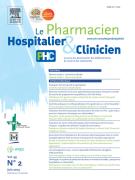PIM-Check© used by physicians to reduce drug-related problems in internal medicine - 22/03/17
 , B. Guignard 1, A. Desnoyer 1, O. Grosgurin 1, C. Marti 1, C. Samer 1, P. Bonnabry 1, 2
, B. Guignard 1, A. Desnoyer 1, O. Grosgurin 1, C. Marti 1, C. Samer 1, P. Bonnabry 1, 2Résumé |
Background and objectives |
Drug related problems (DRPs) are important issues for inpatient safety and may conduct to adverse drug events, increase length of stay and hospital costs. Potentially inappropriate medication (PIM) including over-prescription (medication without a valid indication or with contra-indication), under-prescription (failure to prescribe a clinically indicated drug) and mis-prescription (unwanted drug- interaction; incorrect prescribing) is a risk factor for DRPs. Several tools have recently been developed to target PIM. One of them, PIM-Check©, is dedicated to internal medicine patients. The aim of this study was to determine if PIM-Check© electronic application, used by physicians, can decrease DRPs in internal medicine patients.
Methods |
Open label, 2 consecutive periods of one month, prospective study, conducted on patients admitted for more than 48h in 7 internal medicine wards in a university hospital. In period 1, patients were treated with usual care (control group). In period 2, patients were treated with usual care preceded by a medication review performed by chief residents within 24h after admission using PIM-Check© electronic application (intervention group). At 48h, all medications, lab results, comorbidities and active diagnosis were collected for each patient. DRPs were identified by a “gold standard” group, composed of a clinical pharmacist, a clinical pharmacologist and two attending-physicians of internal medicine analysing all patients-dataset (blinded to period group).
Results |
Two hundred ninety-seven patients were included: 188 in control group and 109 in intervention group. A total of 909 DRPs (mean/patient±SD: 3.1±2.2) were identified: 3.2±2.2 in control group and 2.9±2.2 in intervention group (P-value 0.21). Both groups were comparable (age, sex, number of drugs, co-morbidities) and had similar mean of DRPs/patients. Top 5 active compound involved in DRPs were: esomeprazole, paracetamol, tobacco, aspirin and thiamine. In the intervention group, the mean number of statements suggested by PIM-Check© was 13.9±7/patients. Among the 311 DRPs identified in this group, 33.4% (n=104) were suggested by PIM-Check©, but no treatment modification were performed.
Discussion and conclusions |
PIM-Check© allowed identifying one third of DRPs approved by a gold standard group. However, the number of DRPs did not decrease in the intervention group when physicians used PIM-Check©. The high number of statements displayed by the electronic application, and the hesitancy of hospital physicians to change treatment associated with chronic medical conditions, especially in the first 48h of hospitalization may explain the lack of impact on the number of DRPs.
Le texte complet de cet article est disponible en PDF.Plan
Vol 52 - N° 1
P. e17-e18 - mars 2017 Retour au numéroBienvenue sur EM-consulte, la référence des professionnels de santé.
L’accès au texte intégral de cet article nécessite un abonnement.
Déjà abonné à cette revue ?

